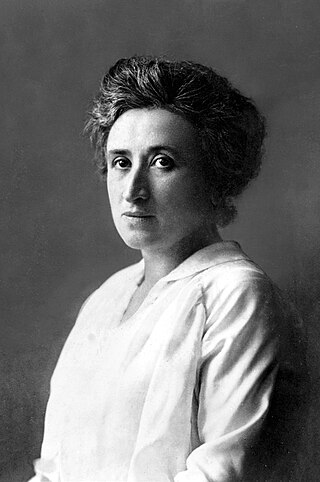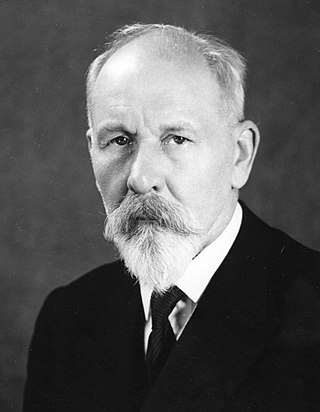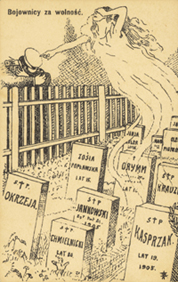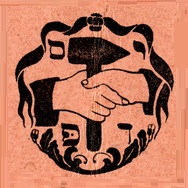
Rosa Luxemburg was a Polish and naturalised-German revolutionary socialist, Marxist philosopher and anti-war activist.
Forward is a relative direction, the opposite of backward.
People's Party, Peoples Party or Popular Party may refer to one of the following political parties.
Revolutionary Socialist Party may refer to:

The Polish Socialist Party is a socialist political party in Poland.

Tomasz Stefan Arciszewski was a Polish socialist politician, a member of the Polish Socialist Party and the 31st Prime Minister of Poland, 3rd Prime Minister of the Polish government-in-exile in London from 1944 to 1947 during which the government lost the recognition of the Western powers.

The Social Democracy of the Kingdom of Poland and Lithuania, Lithuanian: Lenkijos karalystės ir Lietuvos socialdemokratija, LKLSD), originally the Social Democracy of the Kingdom of Poland (SDKP), was a Marxist political party founded in 1893 and later served as an autonomous section of the Russian Social Democratic Labour Party. It later merged into the Communist Workers Party of Poland. Its most famous member was Rosa Luxemburg.
Bezdany raid was a train robbery carried out on the night of 26/27 September 1908 in the vicinity of Bezdany near Vilna on a Russian Empire passenger and mail train by a group of the Combat Organization of the Polish Socialist Party led by Józef Piłsudski.

The Combat Organization of the Polish Socialist Party, also translated as Fighting Organization of the Polish Socialist Party; also known as bojówki ; Organizacja Spiskowo-Bojowa PPS ; Koła Bojowe Samoobrony Robotniczej and Koła Techniczno-Bojowe, was an illegal Polish guerrilla organization founded in 1904 by Józef Piłsudski.

The Polish Socialist Party – Revolutionary Faction also known as the Old Faction was one of two factions into which the Polish Socialist Party split in 1906. The Revolutionary Faction's primary goal was to restore an independent Poland, which was envisioned as a representative democracy.
Polish Socialist Party – Left, also known as the Young Faction, was one of two factions into which Polish Socialist Party divided itself in 1906. Its primary goal was transform Poland into a socialist country, established through proletarian revolution, and likely a member of some international communist country.

A major part of the Russian Revolution of 1905 took place in the Russian Partition of Poland and lasted until 1907. It was the largest wave of strikes and widest emancipatory movement that Poland had ever seen until the 1970s and the 1980s. One of the major events of that period was the insurrection in Łódź in June 1905. Throughout that period, many smaller demonstrations and armed struggles between the peasants and workers on one side and the government on the other took place. The demands of the demonstrators included the improvement of the workers' living conditions, as well as political freedoms, particularly related to increased autonomy for Poland. Particularly in 1905, Poland was at the verge of a new uprising, revolution or civil war. Some Polish historians even consider the events of that period a fourth Polish uprising against the Russian Empire.

The Jewish Social Democratic Party in Galicia was a political party in Galicia and later also Bukovina, established in a split from the Polish Social Democratic Party of Galicia (PPSD) in 1905. The party made its first public appearance on May 1, 1905, with separate May Day rallies in Kraków, Lemberg, Tarnów and Przemyśl. However, as the new party stressed that it was not a competitor of the existing Social Democratic parties, they later joined the PPSD celebrations.
Ukrainian Social Democratic Party was a political party in Galicia. The party was founded in 1899 as an autonomous section of the Galician Social Democratic Party in Austrian Galicia and later became a separate party in 1907. During the brief Western Ukrainian People's Republic (1918-1919) the party was briefly in government, before going into opposition. After the capture of Galicia by the Second Polish Republic, the party became part of the constitutional Ukrainian resistance to Polish rule before being banned and mostly being subsumed into other socialist movements.

The Belostok (Białystok) pogrom occurred between 14–16 June 1906 in Białystok, Poland. During the pogrom between 81 and 88 people were killed by soldiers of the Imperial Russian Army, the Black Hundreds and the Chernoe Znamia, and about 80 people were wounded.
The Georgian Socialist-Federalist Revolutionary Party was a Georgian nationalist party, founded in April 1904. The party's program demanded the national autonomy of Georgia, within the framework of a Russian federal state, and advocated for a democratic socialist system. Mainly based in the rural areas, the party's membership was almost entirely drawn from the peasantry and the petty gentry. The political profile of the party had an appeal amongst moderately nationalist intellectuals, schoolteachers and students. The party strived that agricultural issues not be decided by central authorities, but by autonomous national institutions. The party published the periodical Sakartvelo.
Secretary is a title often used in organizations to indicate a person having a certain amount of authority, power, or importance in the organization. Secretaries announce important events and communicate to the organization. The term is derived from the Latin word secernere, "to distinguish" or "to set apart", the passive participle meaning "having been set apart", with the eventual connotation of something private or confidential, as with the English word secret. A secretarius was a person, therefore, overseeing business confidentially, usually for a powerful individual.
Socialist Workers Party may refer to:

Poale Zion was a movement of Marxist–Zionist Jewish workers founded in various cities of Poland, Europe and the Russian Empire in about the turn of the 20th century after the Bund rejected Zionism in 1901.









